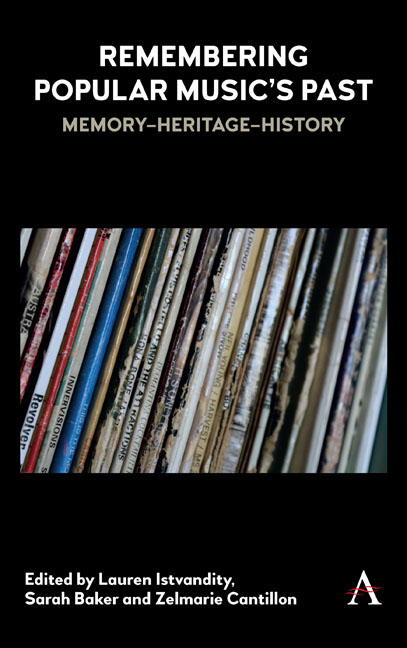Book contents
- Frontmatter
- Contents
- List of Figures
- Acknowledgements
- Chapter 1 The Precarity of Memory, Heritage and History in Remembering Popular Music's Past
- Part I MEMORY
- Part II HERITAGE
- Part III HISTORY
- Chapter 12 Jim Jarmusch's Mystery Train (1989): Representing the Memphis Music Legacy on Film
- Chapter 13 Phenomenology of the Surf Ballroom's Winter Dance Party: Affect and Community at a Popular Music Heritage Tourism Event
- Chapter 14 Disappearing History: Two Case Studies on the Precarity of Music Writing
- Chapter 15 Great Albums, Greedy Collectors and Gritty Sounds? A View from ‘Snobbish Connoisseurs’ on the Canonization and Archivalism of Korean Pop-Rock
- Chapter 16 Towards a Feminist History of Popular Music: Re-examining Writing on Musicians and Domestic Violence in the Wake of #MeToo
- List of Contributors
- Index
Chapter 14 - Disappearing History: Two Case Studies on the Precarity of Music Writing
from Part III - HISTORY
Published online by Cambridge University Press: 09 July 2019
- Frontmatter
- Contents
- List of Figures
- Acknowledgements
- Chapter 1 The Precarity of Memory, Heritage and History in Remembering Popular Music's Past
- Part I MEMORY
- Part II HERITAGE
- Part III HISTORY
- Chapter 12 Jim Jarmusch's Mystery Train (1989): Representing the Memphis Music Legacy on Film
- Chapter 13 Phenomenology of the Surf Ballroom's Winter Dance Party: Affect and Community at a Popular Music Heritage Tourism Event
- Chapter 14 Disappearing History: Two Case Studies on the Precarity of Music Writing
- Chapter 15 Great Albums, Greedy Collectors and Gritty Sounds? A View from ‘Snobbish Connoisseurs’ on the Canonization and Archivalism of Korean Pop-Rock
- Chapter 16 Towards a Feminist History of Popular Music: Re-examining Writing on Musicians and Domestic Violence in the Wake of #MeToo
- List of Contributors
- Index
Summary
Within academia, popular music heritage projects often rely on repositories of secondary data. While fieldwork and primary collection is prevalent, the interface between popular culture and the academy hinges on intermediaries. In this chapter, I investigate a set of recent media relations –all online –and examine how the precarity of this environment may shift priorities within music heritage projects. In short, I argue that the academy might be wise to move some of its preservation energies into projects that retain and/ or curate key secondary data sources within popular music studies. These projects would be conducted in lieu of losing significant archives of music commentary and journalism to the extraordinarily brittle marketplace for online content. Later in this chapter, I provide two case studies that speak to the dynamics of these market realities, providing examples of how data is lost and the speed of its disappearance from the commons.
To begin, I would like to start with a seldom acknowledged point: it is difficult to imagine popular music studies without music journalism and criticism. The data collected by music reportage (artist interviews, profiles, histories, feature stories) and critical writing (reviews, editorial, think pieces) is frequently drawn into popular music's cultural research methodologies, either via quotation or as a point of inspiration. It is not uncommon, at all, for citations drawn from the music sections of newspapers, magazines, blogs and web articles to appear in scholarly popular music papers, and a historical association between the two fields exists; academic writers like Simon Frith and Greil Marcus have long straddled both worlds in varying capacities, and cultural studies and music academics freelancing as music critics or acting in journalistic capacities are far from rare. These close ties were established early within popular music studies, typically driving research into areas of inquiry specifically avoided by, or of little value to, music writing more broadly. Similarly, music writing has media access to that which the academy struggles to attain, namely the restricted zones of commercial industry. A type of feedback loop exists. There are clear theoretical and thematic links between the two fields of production.
- Type
- Chapter
- Information
- Remembering Popular Music's PastMemory-Heritage-History, pp. 189 - 202Publisher: Anthem PressPrint publication year: 2019



